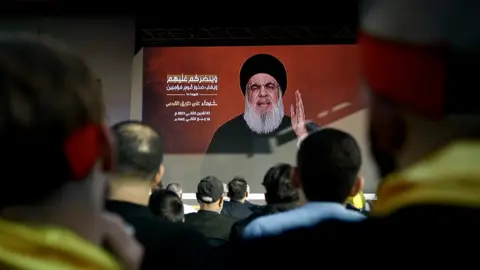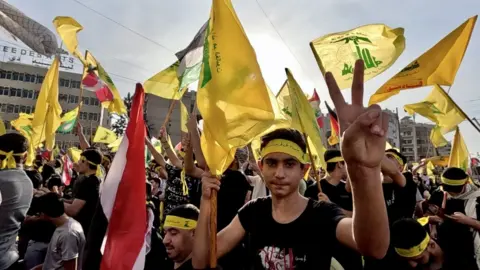Hezbollah steps back from all-out war on Israel over Gaza - for now
 Goktay Koraltan, BBC
Goktay Koraltan, BBCThe Hezbollah leader took his time to respond to the past month of bloodletting which has turned the Middle East into a tinder box.
And when Hassan Nasrallah spoke, what he did not say was as important as what he said.
There was no declaration of all-out war on Israel. At least, not now.
Few in Lebanon had expected one.
Nasrallah knows there is little appetite in this country for another war with its powerful neighbour. The last one was in 2006.
Lebanese have troubles enough, with a shattered economy and a bankrupt political system.
That is a powerful deterrent, along with the two American aircraft carriers recently deployed to the eastern Mediterranean.
Hassan Nasrallah addressed the segregated rally - thousands strong - by video link from an undisclosed location.
It was not just his supporters who were hanging on his every word. His speech was required listening in Tel Aviv and in Washington. What Hezbollah does - or does not do - could be crucial now.
The Hezbollah leader declared that "all options are open," adding that "the situation could escalate militarily at any time".
That would depend, he said, on Israel's actions in Gaza, and its approach towards Lebanon.
Hezbollah is already stepping up the pressure on Israel with an escalation in cross-border attacks, which has forced the Israeli army to divert troops to the area.
But Hamas wants more from its ally.
'100% Palestinian operation'
At times, the fiery cleric sounded almost defensive about what his fighters have done so far.
"What's taking place on our front is very important and significant," he said.
"Those who claim that Hezbollah should engage swiftly in an all-out war with the enemy might see what is taking place on the border as minimal. But if look objectively, we will find it sizeable."
He said 57 Hezbollah fighters had been killed in recent weeks.
Predictably, he left the door open for a further escalation.
"I assure you this will not be the end," he said, "this will not be sufficient."
Hassan Nasrallah insisted that the 7 October attacks by Hamas were a "100% Palestinian operation", carried out in great secrecy, concealed even from Hamas's allies.
"It has no relation to any regional or international issues," he said, in effect claiming he did not know and neither did Iran.
 Goktay Koraltan, BBC
Goktay Koraltan, BBCCrowds chanted, "We are with you Nasrallah" as they waited under a hot sun at a rally in southern suburbs of Beirut.
On a rooftop overlooking the gathering, a masked man kept watch, with a bulky jamming device to block drones.
This is Hezbollah heartland, where many are devoted to the Islamist group, which - like Hamas - is classed as a terrorist organisation by the UK and the US, and many other governments.
"I don't think he [Nasrallah] is going to bring war to the whole country," said Fatima, a 17-year-old journalism student with gold rimmed glasses, "but whatever he decides, I am fine with it. If it is war, I am not afraid. I don't think there is anything better than dying for a good cause. We are standing with our Palestinian brothers and sisters."
The indications are that Hezbollah plans to leave the war in Gaza to Hamas, for now.
But that calculus could change quickly if Hamas comes close to defeat.
If Israel achieves a victory in Gaza, the cost could be a much bigger war - with Hezbollah.

More on Israel-Gaza war
- Follow live: Latest updates
- Analysis: Jeremy Bowen's five new realities after four weeks of war
- From Gaza: Stories of those killed in Gaza
- Watch: Breaking down videos from Gaza's secret tunnels
- Explained: Ros Atkins on... Calls for a ceasefire in Gaza
- History behind the story: The Israel-Palestinian conflict
